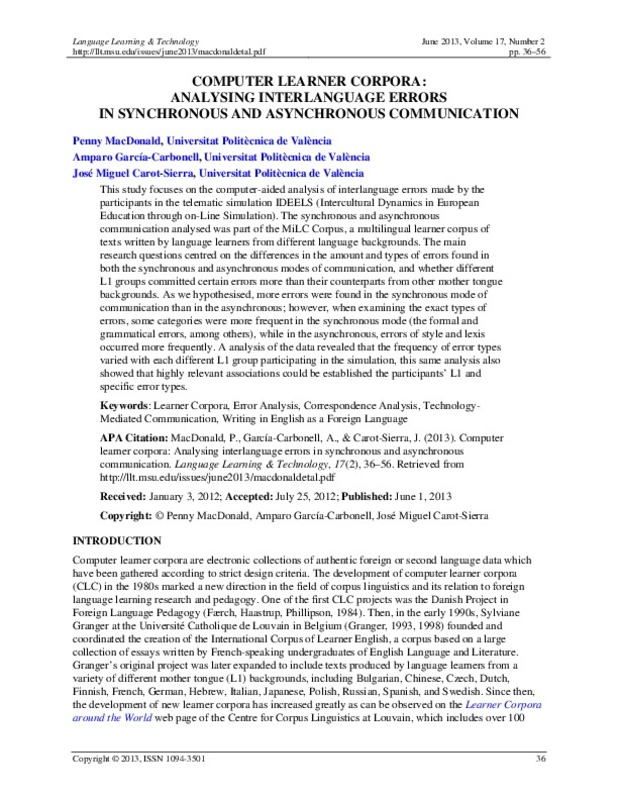JavaScript is disabled for your browser. Some features of this site may not work without it.
Buscar en RiuNet
Listar
Mi cuenta
Estadísticas
Ayuda RiuNet
Admin. UPV
Computer learner corpora: analysing interlanguage errors in synchronous and asynchronous communication
Mostrar el registro sencillo del ítem
Ficheros en el ítem
| dc.contributor.author | Mac Donald, Penny
|
es_ES |
| dc.contributor.author | García Carbonell, Amparo
|
es_ES |
| dc.contributor.author | Carot Sierra, José Miguel
|
es_ES |
| dc.date.accessioned | 2016-06-14T09:57:07Z | |
| dc.date.available | 2016-06-14T09:57:07Z | |
| dc.date.issued | 2013-06 | |
| dc.identifier.issn | 1094-3501 | |
| dc.identifier.uri | http://hdl.handle.net/10251/65848 | |
| dc.description.abstract | [EN] This study focuses on the computer-aided analysis of interlanguage errors made by the participants in the telematic simulation IDEELS (Intercultural Dynamics in European Education through on-Line Simulation). The synchronous and asynchronous communication analysed was part of the MiLC Corpus, a multilingual learner corpus of texts written by language learners from different language backgrounds. The main research questions centred on the differences in the amount and types of errors found in both the synchronous and asynchronous modes of communication, and whether different L1 groups committed certain errors more than their counterparts from other mother tongue backgrounds. As we hypothesised, more errors were found in the synchronous mode of communication than in the asynchronous; however, when examining the exact types of errors, some categories were more frequent in the synchronous mode (the formal and grammatical errors, among others), while in the asynchronous, errors of style and lexis occurred more frequently. A analysis of the data revealed that the frequency of error types varied with each different L1 group participating in the simulation, this same analysis also showed that highly relevant associations could be established the participants’ L1 and specific error types. | es_ES |
| dc.description.sponsorship | Penny MacDonald would like to acknowledge the research grant awarded by the Research and Development Support Programme (PAID-00-10) of the Universidad Politécnica de Valencia in 2010 | |
| dc.language | Inglés | es_ES |
| dc.publisher | University of Hawai‘i | es_ES |
| dc.relation.ispartof | Language Learning & Technology | es_ES |
| dc.rights | Reserva de todos los derechos | es_ES |
| dc.subject | Learner Corpora | es_ES |
| dc.subject | Error Analysis | es_ES |
| dc.subject | Correspondence Analysis | es_ES |
| dc.subject | Technology-Mediated Communication | es_ES |
| dc.subject | Writing in English as a Foreign Language | es_ES |
| dc.subject.classification | ESTADISTICA E INVESTIGACION OPERATIVA | es_ES |
| dc.subject.classification | FILOLOGIA INGLESA | es_ES |
| dc.title | Computer learner corpora: analysing interlanguage errors in synchronous and asynchronous communication | es_ES |
| dc.type | Artículo | es_ES |
| dc.relation.projectID | info:eu-repo/grantAgreement/UPV//PAID-00-10/ | es_ES |
| dc.rights.accessRights | Abierto | es_ES |
| dc.contributor.affiliation | Universitat Politècnica de València. Departamento de Lingüística Aplicada - Departament de Lingüística Aplicada | es_ES |
| dc.contributor.affiliation | Universitat Politècnica de València. Departamento de Estadística e Investigación Operativa Aplicadas y Calidad - Departament d'Estadística i Investigació Operativa Aplicades i Qualitat | es_ES |
| dc.description.bibliographicCitation | Mac Donald, P.; García Carbonell, A.; Carot Sierra, JM. (2013). Computer learner corpora: analysing interlanguage errors in synchronous and asynchronous communication. Language Learning & Technology. 17(2):36-56. http://hdl.handle.net/10251/65848 | es_ES |
| dc.description.accrualMethod | S | es_ES |
| dc.relation.publisherversion | http://llt.msu.edu/issues/june2013/macdonaldetal.html | es_ES |
| dc.description.upvformatpinicio | 36 | es_ES |
| dc.description.upvformatpfin | 56 | es_ES |
| dc.type.version | info:eu-repo/semantics/publishedVersion | es_ES |
| dc.description.volume | 17 | es_ES |
| dc.description.issue | 2 | es_ES |
| dc.relation.senia | 261361 | es_ES |
| dc.contributor.funder | Universitat Politècnica de València |






